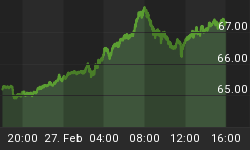The following is part of Piotal Events that was published for our subscribers March 10, 2016.
Signs of The Times
"HYG - the high yield bond fund - is trading at its richest NAV in over 4 years."
- Zero Hedge, March 2.
That rally clocked 7 straight days of net inflows.
"Bavarian Banking Association has recommended that its member banks start stockpiling physical cash."
- Der Spiegal, March 3.
Needless to say, but the memo is defying ECB policy to scorn cash.
History's big theme has been to hoard hard assets, which crash. Then the theme is to hoard financial assets, which crash. Then the focus is to hoard cash.
"House flipping - buying and selling to make a quick buck - has risen."
- Reuters, March 3.
"It isn't just energy loans. Problems are also popping up in banks' consumer-loan books, especially for autos."
- Wall Street journal, March 4.
"A modest proposal: Gift the BLS to The Democratic National Committee or Sell it to CNBC"
- David Stockman, March 5.
"Have art prices peaked? Auction houses report falling profits as the value of even Picassos tumble."
- Daily Mail, March 5.
Perspective
Assets, including illiquid ones like art, cars and houses have become volatile. A Picasso that traded for GBP 18.9 million in January had traded for GBP 28 million in 2013.
And then there is the mania in Vancouver. Nice house with a view into English Bay lists for $7 million and trades for $9 million.
An index of residential real estate in Hong Kong is down some 25 percent since its peak in August.
A very successful developer in Vancouver got his start in the early 1960s. He bought a triplex from a speculator who had bought it as a "flip" in 1928. After 32 years of declining prices and declining rentals the "flipper" had finally got his 1928 price.
As memory serves, Vancouver house prices peaked with commodities in 1974 and in 1980. Excessive speculation now in Vancouver has been driven largely by Asian money. In which case it is vulnerable to the global credit contraction.
Credit Markets
Spread ETFs (TLT/JNK) narrowed from 4.29 in early February to 3.78 on Friday. This was just below the 50-Day and taking it out reverses the action to widening.
On the same move, the CCC spread narrowed from 20.66 on February 11 to 18.49 this week. This has been the most significant correction in spreads since the problems started last July.
Since early February there has been little net change in the Treasury curve, which has helped the Banks. The next phase of flattening may have started.
The long bond (TLT) corrected from the 135 level to 127, which was just above the 50-Day. Last week, we noted that it was preparing for the next rally.
Also last week, we noted that the rally in JNK was working on a big swing from oversold to overbought. The high was 33.94 on Friday and the price has declined a little. It is following the 20-Week ema down. In searching for small mercies, the decline is not as steep as in 2008. It is more like the slump of 2001 to 2002.
Currencies
The DX continues to trade between the 50 and 200-Day moving averages. Momentum is neutral, but the tendency is to drift down.
Last week, we thought that the Canadian dollar was becoming overbought, but had a few weeks more in the rally.
Up 1.25% yesterday, it is taking another run at getting above the 200-Day ma.
Perhaps it has something to do with Prime Minister Moonbeam's heralded meeting with President Moonbeam?
It was grand. State Dinner, the White House and a Dialogue of Teleprompters.
High Yield Bond Spreads

Source: Zero Hedge
- Previous examples of distress or panic are noted.
- The doted red line denotes the "breakouts" in spreads preliminary to the dislocations.
- Last summer's "breakout" prompted the initial Shanghai Crisis.
- The next "breakout' is developing.
- It could be associated with commodities turning down - again.
Government Excess: Private Deprivation

- Inflating wages in education prompt soaring student debt.
- Just one example of the consequences of bureaucratic corruption.
- Arbitrary intrusion started in the early 1900s.
- It is reaching "Ending Action".
- What funds excessive government is soaring assets prices and expanding credit.
- Both are faltering.
Business Confidence Breaks Down

- Note the key breakdown in September-October 2007.
- The high for the S&P was set in October 2007.
- The "Great Recession" started in that fateful December.
- Has the next "Great Recession" started?
Link to March 11, 2016 Bob Hoye interview on TalkDigitalNetwork.com: http://talkdigitalnetwork.com/2016/03/big-short-squeeze-hits-equity-markets/
Listen to the Bob Hoye Podcast every Friday afternoon at TalkDigitalNetwork.com















